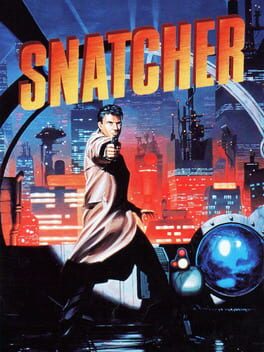I wasn’t completely surprised when jumping into one of Kojima’s earliest games and immediately recognizing how much Snatcher’s genealogy is inherited through his later body of work. His signature hallmarks are all proudly showcased here. Yeah, Kojima definitely whipped out his love for cinema with this one to gush how much he loved Blade Runner, Terminator, Akira, and Invasion of the Body Snatchers. That signature quirky meta humor he enjoys injecting with how everything in the game is deeply aware of the fact it’s, uh, well, a video game. Your miniature robot companion, “Metal Gear Mk. II”, is a cheeky nod to the game Kojima previously worked on before and, interestingly, even gets reintroduced down the line in MGS4 as a reverse callback. You can especially see how much of Snatcher’s story-driven adventure gameplay, interacting and talking to a colorful cast of characters, would evolve into the codec calls in Metal Gear Solid. Above all else, Snatcher helped pioneer what elevated Kojima to renowned status as a legendary game developer by tackling bold ideas through his commentary. It weaves the very on-its-sleeve science fiction inspirations to create a dystopian cyberpunk noir setting plagued by uncertainty and distrust. Technology being a mere tool for manipulation preying on humanity’s distrust for control which gave it room to exist freely in the first place. Which overlaps with one of the bigger themes explored in the Metal Gear Solid franchise with the importance of human ingenuity against technological artificiality. Something that our protagonist grapples with himself, bumbling around with a case of amnesia, too flirty with every woman he meets, trying to be on the same wavelength with his robot partner, while being wary of who’s real or fake during his investigation.
It never overstays its welcome, wrapping itself up as a tightly paced seven to eight-hour narrative experience with a moody vibesworthy soundtrack and some phenomenal pixel art to stare deeply into. While there’s a logical progression of how you’re supposed to go from one point to the next in advancing the story, aside from a few clumsy moments, it doesn’t reach the point of hitting a deadend. You might fail in some investigative detective work the game puts you up for the test, but you’re still narrowing down options for the right course of action instead of getting abruptly softlocked. I only suggest that you didn’t need to exhaust every single dialogue option or action, multiple times even, just to trigger something to get the story moving along. It’s gotten a cult following overtime, but I kinda wished this left a heavy footprint on an entire generation of aspiring game developers, y’know? There’s a lot here, creatively, that isn’t too far apart from what made Undertale so charming and influential. In a completely different alternate timeline I could even see a version of myself that has more stock in making games taking unashamed heavy cues from this tbh.
It never overstays its welcome, wrapping itself up as a tightly paced seven to eight-hour narrative experience with a moody vibesworthy soundtrack and some phenomenal pixel art to stare deeply into. While there’s a logical progression of how you’re supposed to go from one point to the next in advancing the story, aside from a few clumsy moments, it doesn’t reach the point of hitting a deadend. You might fail in some investigative detective work the game puts you up for the test, but you’re still narrowing down options for the right course of action instead of getting abruptly softlocked. I only suggest that you didn’t need to exhaust every single dialogue option or action, multiple times even, just to trigger something to get the story moving along. It’s gotten a cult following overtime, but I kinda wished this left a heavy footprint on an entire generation of aspiring game developers, y’know? There’s a lot here, creatively, that isn’t too far apart from what made Undertale so charming and influential. In a completely different alternate timeline I could even see a version of myself that has more stock in making games taking unashamed heavy cues from this tbh.
